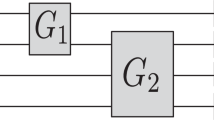Abstract
There are two schools of “measurement-only quantum computation”. The first (Phys. Rev. Lett. 86(22), 5188–5191 (2001)) using prepared entanglement (cluster states) and the second (Phys. Rev. Lett. 101(1), 010501 (2008)) using collections of anyons which, according to how they were produced, also have an entanglement pattern. We abstract the common principle behind both approaches and find the notion of a graph or even continuous family of equiangular projections. This notion is the leading character in the paper. The largest continuous family, in a sense made precise in Corollary 4.2, is associated with the octonions and this example leads to a universal computational scheme. Adiabatic quantum computation also fits into this rubric as a limiting case: nearby projections are nearly equiangular, so as a gapped ground state space is slowly varied, the corrections to unitarity are small.
Similar content being viewed by others
References
Adams, J.F.: On the non-existence of elements of Hopf invariant one. Ann. Math. 72, 20–104 (1960)
Aharonov, D., Van Dam, W., Kempe, J., Landau, Z., Lloyd, S., Regev, O.: Adiabatic quantum computation is equivalent to standard quantum computation. SIAM Rev. 50(4), 755–787 (2008)
Arora, S., Barak, B.: Computational Complexity: A Modern Approach. Cambridge University Press, Cambridge (2009)
Bonderson, P., Freedman, M., Nayak, C.: Measurement-only topological quantum computation. Phys. Rev. Lett. 101(1), 010501 (2008)
Bonderson, P., Freedman, M., Nayak, C.: Measurement-only topological quantum computation via anyonic interferometry. Ann. Phys. 324(4), 787–826 (2009)
Bonderson, P., Nayak, C.: Quasi-topological phases of matter and topological protection. Phys. Rev. B 87(19), 195451 (2013)
Fisher, M.P.: Quantum cognition: the possibility of processing with nuclear spins in the brain. Ann. Phys. 362, 593–602 (2015)
Kitaev, A.Y.: Quantum computations: algorithms and error correction. Russ. Math. Surv. 52(6), 1191–1249 (1997)
Kitaev, A.Y.: Fault-tolerant quantum computation by anyons. Ann. Phys. 303(1), 2–30 (2003)
Lundell, A.T.: Concise tables of James numbers and some homotopy of classical Lie groups and associated homogeneous spaces. In: Lundell, A.T. (ed.) Algebraic Topology Homotopy and Group Cohomology, pp. 250–272. Springer, Berlin (1992)
Raussendorf, R., Briegel, H.J.: A one-way quantum computer. Phys. Rev. Lett. 86(22), 5188–5191 (2001)
Shor, P., Sloane, N.J.A.: A family of optimal packings in grassmannian manifolds. J. Algebr. Combin. 7(2), 157–163 (1998)
Yunger Halpern, N., Crosson, E.: Quantum information in quantum cognition. arXiv:1171.04801(2017)
Zauner, G.: Quantum designs—foundations of a non-commutative design theory. Ph.D. thesis, University of Vienna (1999)
Author information
Authors and Affiliations
Corresponding author
Rights and permissions
About this article
Cite this article
Freedman, M., Shokrian-Zini, M. & Wang, Z. Quantum Computing with Octonions. Peking Math J 2, 239–273 (2019). https://doi.org/10.1007/s42543-019-00020-3
Received:
Revised:
Accepted:
Published:
Issue Date:
DOI: https://doi.org/10.1007/s42543-019-00020-3






